|
|
|
Sort Order |
|
|
|
Items / Page
|
|
|
|
|
|
|
| Srl | Item |
| 1 |
ID:
138160
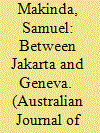

|
|
|
|
|
| Summary/Abstract |
Australia's engagement with Africa during the Rudd and Gillard governments was primarily driven by the national interest, which revolved around three issues: humanitarianism, support for mining corporations, and the United Nations Security Council seat. This article argues that there is a need for the Abbott government to retain the same depth and breadth of relationships with Africa. It is in the interest of both Australia and African states for the Australian government to remain committed to humanitarian objectives and to help African countries meet some of their Millennium Development Goal targets. Moreover, the continued support of Australian mining corporations operating in Africa, especially through the training of African policy makers in mining governance, is good for both Africa and Australia. Finally, Australia's continued success in multilateral diplomacy will depend on support from all parts of the world, including Africa. Australia's success at the multilateral level will, in turn, result in bilateral benefits in other regions, including the Asia-Pacific.
|
|
|
|
|
|
|
|
|
|
|
|
|
|
|
|
| 2 |
ID:
138159
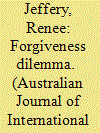

|
|
|
|
|
| Summary/Abstract |
In post-conflict politics, forgiveness is as controversial as it is popular. Generally conceived as the overcoming of negative moral emotions such as resentment and anger, forgiveness is, on the one hand, credited with bestowing significant psychological benefits on its practitioners, contributing to processes of interpersonal and societal reconciliation, and avoiding revenge. On the other hand, however, critics warn that rather than helping to address the negative emotions, forgiveness actually helps to provoke resentments and grievances by heaping injustice upon injustice. Herein lies the dilemma with which this article is concerned. By examining the nature of the negative emotions and their relationship to the pursuit of justice, as well as the nature and consequences of forgiveness, it considers the role that victim participation in human rights trials plays in helping post-conflict societies to overcome the forgiveness dilemma. To do so, it focuses on Case 001, heard before the Extraordinary Chambers in the Courts of Cambodia.
|
|
|
|
|
|
|
|
|
|
|
|
|
|
|
|
| 3 |
ID:
138158
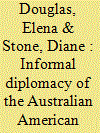

|
|
|
|
|
| Summary/Abstract |
After 20 years, the Australian American Leadership Dialogue has acquired enviable access to political leaders in the foreign policy establishments of both countries. The influence of the Dialogue is at earlier consensus-building stages of decision making. Its importance has been in ‘relationship maintenance’ of the bilateral alliance which it has pursued through processes of informal diplomacy. The Dialogue now faces its own challenges of organisational renewal and relevance in the wider ‘interpretative community’ of Australian think tanks, university policy institutes and opinion-formers.
|
|
|
|
|
|
|
|
|
|
|
|
|
|
|
|
| 4 |
ID:
138162
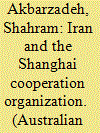

|
|
|
|
|
| Summary/Abstract |
The Islamic Republic of Iran has pursued full membership in the Shanghai Cooperation Organisation (SCO). In doing so, Iran has appeared to be unfazed by the prospect of allying with Russia and China, two countries which have systematically suppressed their Muslim minorities for decades. Similarly, the SCO's Central Asian member states are led by individual leaders who are generally believed to rule in spite of their populations. As a result, Iran's eagerness to join the SCO may appear to contradict its self-promoted image as the champion of Muslim interests, but in reality it sits nicely within its overarching enmity for the USA. Indeed, the SCO is seen as a geopolitical counterweight to the USA. For Iran, this geopolitical opportunity overrides ideological imperatives, with the gap between ideology and geopolitics most evident under the presidency of Mahmoud Ahmadinejad.
|
|
|
|
|
|
|
|
|
|
|
|
|
|
|
|
| 5 |
ID:
138156


|
|
|
|
|
| Summary/Abstract |
Malcolm Fraser's book Dangerous Allies (Fraser with Roberts 2014) has rightly been taken to task, even by broadly sympathetic readers, for the way it caricatures US foreign policy (White 2014). It leaves the absurd impression that almost everything Washington does in the world today is a wilfully dangerous extension of the neoconservative crusade of a decade ago. The book has at least one other equally unsettling flaw: the way it misreads or misrepresents contemporary Asia. The author privileges his own version of China's strategic priorities and sensitivities far above the interests and perspectives of other Asian countries. This lack of balance, combined with a false depiction of the USA, greatly weakens the credibility of the book's core conclusions about revisiting and perhaps ending the security alliance between the USA and Australia.
|
|
|
|
|
|
|
|
|
|
|
|
|
|
|
|
| 6 |
ID:
138157
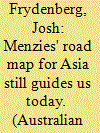

|
|
|
|
|
| Summary/Abstract |
This is an excerpt from the 2014 Sir Robert Menzies Lecture, delivered by the Honourable Josh Frydenberg, the Parliamentary Secretary to the Prime Minister and the Federal Member for Kooyong, on August 14, 2014, in the Queen's Hall at the Parliament of Victoria, Melbourne. In these remarks, I argue that Sir Robert Menzies oversaw a paradigm shift in our understanding of our neighbours and in our neighbours' understanding of us. He did so by repositioning Australia among the rising powers of Asia and by creating a coherent framework of regional engagement. For too long, the political opponents of the Liberal Party of Australia have propagated a myth that it was only Labor that truly understood our region and capitalised on its opportunities. This is patently false. The explicit denigration of Menzies and, in more recent times, John Howard and Tony Abbott for their approach to Asia should be exposed for what it is: ideologically driven, partisan polemics, which bear no resemblance to the facts. Paul Keating is wrong to suggest that in order for Australia to achieve, in his words, our ‘destiny in Asia and the Pacific’, we must somehow change our national identity and the nature of who we are. Foreign policy is about advancing the national interest and must never be a proxy for reshaping our nation's identity by stealth. As Shakespeare said, ‘What's past is prologue’, and only if we can truthfully understand the past will we be ready for the future.
|
|
|
|
|
|
|
|
|
|
|
|
|
|
|
|
| 7 |
ID:
138163


|
|
|
|
|
| Summary/Abstract |
Fuelled by unparalleled recent development, China has by necessity been reaching outward in search of foreign resources and international recognition. The three books reviewed in this essay all speak to China's spectacular global ascendency of the past two decades—and to the political consequences and international reactions that have followed. What unites these three volumes—Tongdong Bai's China: The Political Philosophy of the Middle Kingdom (2012), Peter Nolan's Is China Buying the World? (2012) and William Callahan and Elena Barabantseva's edited volume, China Orders the World: Normative Soft Power and Foreign Policy (2011)—is their focus on the uniquely Chinese norms that now underpin China's soft power in the twenty-first century. How will China go about ordering the world and will it succeed? The answers to these questions, as these authors demonstrate, may have less to do with China's present than with its ancient past.
|
|
|
|
|
|
|
|
|
|
|
|
|
|
|
|
| 8 |
ID:
138161
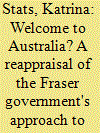

|
|
|
|
|
| Summary/Abstract |
The Fraser government's response to the Indo-Chinese refugee crisis and the presentation, for the first time, of asylum-seekers arriving in Australia by boat is almost universally acclaimed as having been proactive, generous and humanitarian in spirit—the antithesis of both the preceding Whitlam Labor government and subsequent governments, particularly since 2001. Adopting a policy of ‘forward selection’ of refugees from camps in South-East Asia, the Fraser government was able to stem the flow of boats and oversaw the relatively uncontroversial resettlement of nearly 70,000 Indo-Chinese. However, the author argues that this was not the brave and principled course of action for which Fraser and his immigration ministers are regularly fêted, but rather a delayed response that was motivated by fear and desperation rather than pure humanitarian intent. The celebrated outcomes of Fraser's policies belie the self-interested way in which they were constructed and neglect the fact that the government did not act until it was forced. Fraser's policies were neither a departure from the past nor the antithesis of current polices; to the contrary, they were the seeds of the contemporary Australian model of asylum.
|
|
|
|
|
|
|
|
|
|
|
|
|
|
|
|
|
|
|
|
|